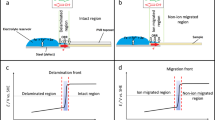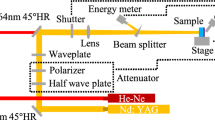Abstract
WE have recently measured the Hall coefficient R and the conductivity σ in oxide coatings sprayed on a magnesia base. By drawing D.C. and pulsed thermionic emission, we have been able to activate the coatings satisfactorily, obtaining a D.C. work function near 1,000° K. of 1·0–1·2 eV., a pulsed work function of 1·2–1·5 eV., and a saturated pulsed emission at 1,050° K. of 4–5 amp./cm.2. R and σ are calculated taking the observed mean thickness of the coating, with no correction for density, which is about unity.
This is a preview of subscription content, access via your institution
Access options
Subscribe to this journal
Receive 51 print issues and online access
$199.00 per year
only $3.90 per issue
Buy this article
- Purchase on Springer Link
- Instant access to full article PDF
Prices may be subject to local taxes which are calculated during checkout
Similar content being viewed by others
References
Vink, H. J., dissertation for doctor's degree in the University of Leyden (1948).
Jenkins, R. O., and Newton, R. H. S., Nature, 163, 572 (1949).
Author information
Authors and Affiliations
Rights and permissions
About this article
Cite this article
WRIGHT, D. Hall Effect in Oxide Cathode Coatings. Nature 164, 714–715 (1949). https://doi.org/10.1038/164714b0
Issue Date:
DOI: https://doi.org/10.1038/164714b0
Comments
By submitting a comment you agree to abide by our Terms and Community Guidelines. If you find something abusive or that does not comply with our terms or guidelines please flag it as inappropriate.



